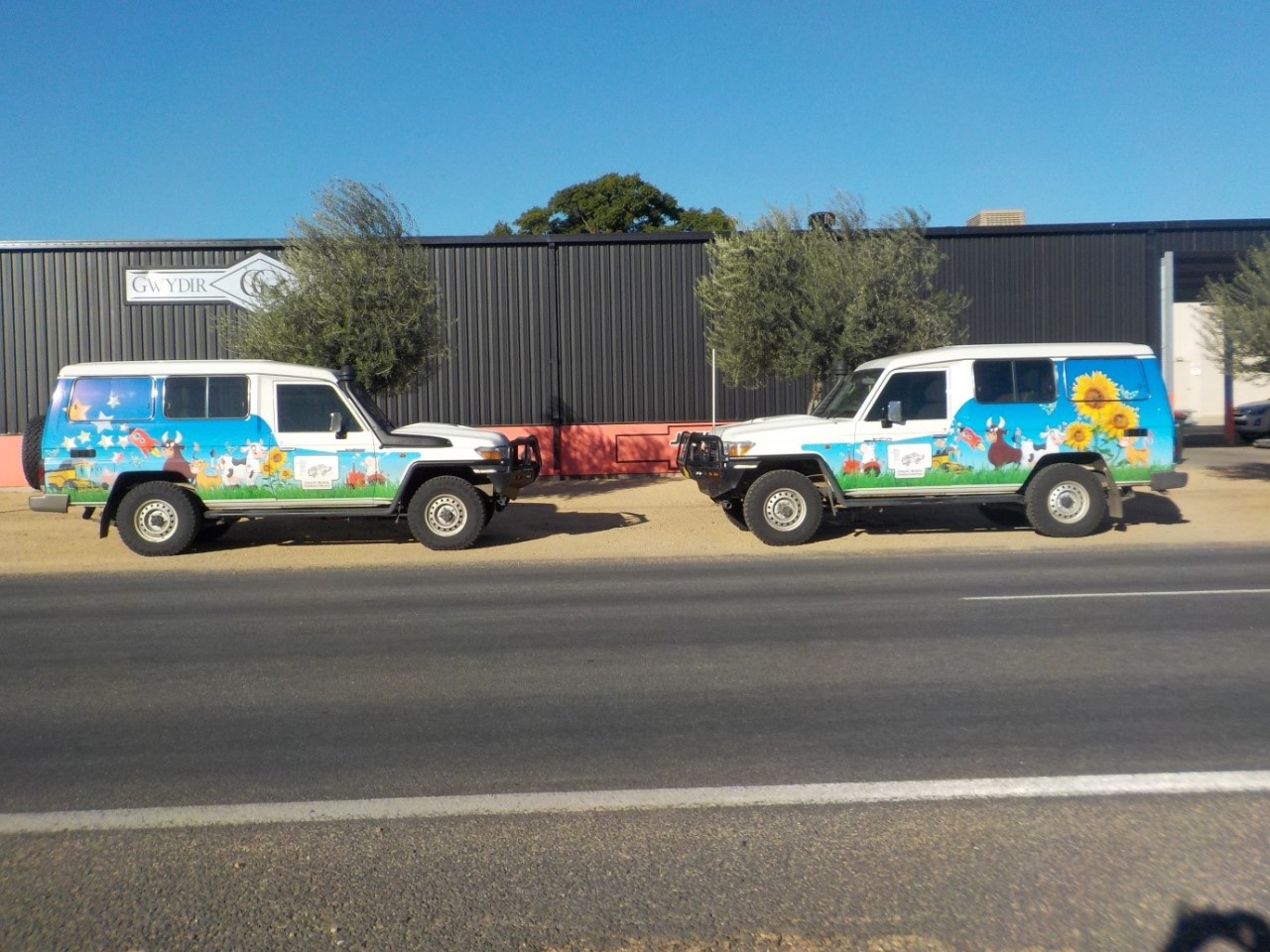Gwydir Mobile Children’s Service keeps relationships central despite challenges

Gwydir Mobile Children’s Service provides an essential service to its rural community, and continues to overcome challenges such as drought, mice plagues, floods and more to create supportive team environments.
In this piece, shared with the New South Wales Department of Education, Wendy Baldwin, teaching Director at the Gwydir Mobile Children’s Service reflects on the challenges of recent times, sharing her insights about working in a mobile service which covers over 1,500 km of Gamileroi country each week.
“After three years of drought and dust storms, a year of COVID, a locust plague, a mouse plague and a serious flood, we know that laughter is our best option,” she begins, setting the scene for a candid reflection on life in rural NSW.
The Gwydir Mobile service uses two vehicles to visit nine venues and serve children isolated by distance, poor roads, dwindling enrollments and lack of services.
“I can say with pride that I have one of the best teams in the world,” Wendy said.
“Working on a mobile is physically hard. Dust storms, mice plagues, flood-based mosquitoes and hard driving are exhausting. Other mobilers in other areas face snow, traffic, wombats, wild pigs and other challenges. Most of us at some point will carry water. Toilets are always a challenge. Yet most mobiles in NSW keep their core staff for more than ten years. The Gwydir Mobile has 10 staff. We average fifteen years and counting for working with us. I believe there are four reasons we have kept our staff: structure, relationships, personalities and laughter.”
“In our leadership team we have three members. We make the final call on day to day management issues,” she continued.
“Our senior players are our long-term staff. They are our strength. Each one of them brings a different perspective. Their life experiences as parents, farmers, contractors and members of the communities in which we operate, feed into the advice and perspectives they give the leadership group.”
The “rookies” are the new staff, and Wendy encourages them to ask for the “why” behind the operation of the service.
“This allows us to notice entrenched behaviour,” she explained. “Being younger, their experiences and interests connect us with many of the parents. This structure means that everyone gets a say, everyone takes responsibility, and everyone buys in. When we buy in, we stay.”
Relationship based leadership
“Relationships are at the core of our team,” Wendy said.
“We don’t look at people as educators. We look at them as workmates who educate with us. What this means is that we accept that family comes first. If you need to meet the need of a family member, drive the chaser bin during harvest, or meet a community expectation then we move hell and high water to allow you to meet your obligations. By doing this we remove the pressure, and the person feels valued.”
More importantly, however, the act of pivoting and supporting each other moves workplace relationships into the realm of friendships, and “friendships are the glue that allow us to face the tough days together and find solutions to our problems. It is also the reason we stay.”
Wendy describes four types of team members in Gwydir – task orientated people, stabilisers, system orientated people and ideas people. It’s the seamless blend of all four which helps the service achieve what it does.
For those who are task orientated, she explained, “we give them the task, the resources and the respect and let them do their thing. This allows them to have autonomy and so they achieve.”
The stabilisers, who want everyone to be happy, are described as the glue that holds the team together.
“They know everyone’s birthday and are the first to notice when someone is upset. We respect these people by listening quietly to their opinions, giving them time to process upcoming change and most importantly acknowledging their contribution.”
System orientated people are respected and supported by having their systems upheld, while ideas people, who can “see potential but not their car keys” are heard and supported.
“When I organise my staff, I am aware of who rubs who the wrong way, so I minimise putting them together for long periods,” Wendy said. “I work out who balances who and put them together. I never ask a staff member to do something that I won’t or don’t do.”
“The strongest part of our team is humour. Laughter is a health giving, friendship making and sanity preserving lifelong habit. Laughter is also one of the most powerful weapons we have in times of fear, doubt, grief and hostility. We laugh at ourselves, at each other, at the ridiculous situations we find ourselves in and at our challenges. Laughter creates perspective. Perspective washes away pettiness and resentment and frustration.”
Ultimately, Wendy believes, all aspects of early childhood education are about relationships.
“Positive, happy educators, develop positive happy children,” she added.
“It takes a lot of work, a lot of patience and some tough conversations. Mostly it takes respect, perspective and humour. We spend a lot of time at work and the work we do is important. Therefore, we owe it to ourselves as well as the children to make those relationships at work be positive ones.”
For more information about Gwydir Mobile Children’s Service, please see here.
Popular

Economics
Policy
Provider
Workforce
Prime Minister Albanese backs Tasmanian Labor’s childcare plan, highlights national early learning progress
2025-06-30 10:42:02
by Fiona Alston

Economics
Provider
Quality
Practice
Policy
Workforce
South Australia announces major OSHC sector reforms aimed at boosting quality and access
2025-06-30 09:49:48
by Fiona Alston

Events News
Marketplace
Practice
Provider
Quality
Research
Workforce
How do you build and keep your dream team? ECEC Workforce and Wellbeing Forum tackles the big questions
2025-06-24 15:20:53
by Fiona Alston












